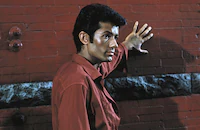After earning an Academy Award for Best Actor for the title role in The King and I (1956), Brynner cultivated his enigmatic but commanding presence in a number of distinctively different roles, from The Ten Commandments (1956) to Anastasia (1956) to The Buccaneer (1958). So playing the chief of a local Indian tribe in Kings of the Sun was no stretch for the Russian-born actor who at various times in his career had played the balalaika in Parisian nightclubs and worked as a trapeze artist.
Of course, the danger with Hollywood spectacles like Kings of the Sun is that the filmmakers sometimes play fast and loose with historical facts or make disastrous casting decisions. When Kings of the Sun opened theatrically, it was the director and former dancer turned dramatic actor George Chakiris, not Brynner, who was singled out for most of the negative critical notices. The New York Times wrote, "J. Lee Thompson, the director who foisted last year's Taras Bulba (1962) on unsuspecting Christmas audiences, has done it again." Still, the Variety critic found things to praise such as the "elaborately mounted" production and Elmer Bernstein's "adventurous score."
Producer: Nate H. Edwards (executive producer), Lewis J. Rachmil
Director: J. Lee Thompson
Screenplay: Elliott Arnold, James R. Webb
Production Design: Alfred Ybarra
Cinematography: Joseph MacDonald
Costume Design: Norma Koch
Film Editing: William Reynolds
Original Music: Elmer Bernstein
Cast: Yul Brynner (Chief Black Eagle), George Chakiris (Balam), Shirley Ann Field (Ixchel), Richard Basehart (Ah Min), Brad Dexter (Ah Haleb).
C-108m. Letterboxed.
by Scott McGee





















